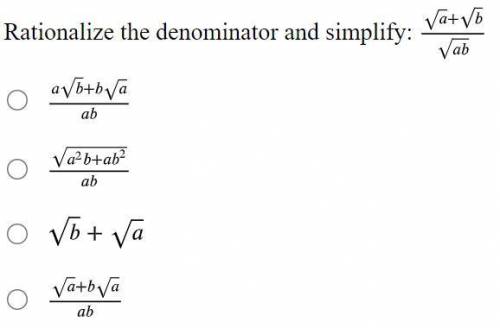Rationalize the denominator and simplify: (\sqrt(a)+\sqrt(b))/(\sqrt(ab))
...

Mathematics, 03.05.2021 21:40 tiwaribianca475
Rationalize the denominator and simplify: (\sqrt(a)+\sqrt(b))/(\sqrt(ab))


Answers: 2


Another question on Mathematics

Mathematics, 21.06.2019 13:00
What is the maximum total area that 450cm of string can enclose if it is used to form perimeters of two adjoining rectangles as shown?
Answers: 1

Mathematics, 21.06.2019 20:30
Martha has a deck of cards. she has lost some of the cards, and now the deck only contains nine spades, eleven diamonds, eight clubs, and twelve hearts. martha predicts that whenever she draws a card from the deck without looking, she will draw a club one-fifth of the time. which activity would best allow martha to test her prediction? a. randomly draw a card from the box and see if it is a club. b. randomly draw a card. then, continue to draw another card until all eight clubs are drawn. c. randomly draw and replace a card 120 times. then, observe how close to 30 times a club is drawn. d. randomly draw and replace a card 100 times. then, observe how close to 20 times a club is drawn.
Answers: 3

Mathematics, 22.06.2019 02:00
Emmanuel added 888 links per minute to his chain mail. allesia started 202020 minutes after emmanuel and added 131313 links per minute to her chain mail. how long had emmanuel worked when allesia caught up to him, and how many links had he added?
Answers: 1

Mathematics, 22.06.2019 02:00
Study published in the journal of personality and individual differences found that adults with adhd displayed more creative achievement than those who didn't have the disorder. "for the same reason that adhd might create problems, like distraction, it can also allow an openness to new ideas," says holly white, assistant professor of cognitive psychology. "not being completely focused on a task lets the mind make associations that might not have happened otherwise." white and priti shah at the university of michigan gave 60 college students – half of them with adhd – a series of tests measuring creativity across 10 domains. the adhd group scored higher across the board. the adhd group showed more of a preference for brainstorming and generating ideas than the non-adhd group, which preferred refining and clarifying ideas. the adhd status of the participants was established by asking whether the individual had ever been clinically diagnosed with adhd/add. the tests of creativity were pencil-and-paper tasks administered in a laboratory setting. each of the ten scales was comprised of multiple questions, the scores on which were summed (e.g., writing creativity: "how many words can you make from the letters in the word 'psychology' invention creativity: "write down as many uses for a paper clip that you can think of.") this procedure does allow for a participant to be scored as showing no creativity under these conditions. a) state the research question in plain language (i wonder if is related to (1 point) b) state the null hypothesis (1 point) c) state the research hypothesis (1 point) d) is the research hypothesis directional or non-directional (1 point) e) name the predictor / independent variable f) give the operational definition of the predictor / independent variable g) evaluate the construct validity of the predictor / independent variable. (face, procedure, method-match) h) name the outcome / dependent variable i) give the operational definition of the outcome / dependent variable. j) evaluate the construct validity of the outcome / dependent variable. (face, procedure, method-match)
Answers: 1
You know the right answer?
Questions

English, 21.04.2021 04:00

Biology, 21.04.2021 04:00

English, 21.04.2021 04:00


Social Studies, 21.04.2021 04:00

Mathematics, 21.04.2021 04:00



Mathematics, 21.04.2021 04:00



Mathematics, 21.04.2021 04:00

Mathematics, 21.04.2021 04:00

Mathematics, 21.04.2021 04:00


Mathematics, 21.04.2021 04:00


Arts, 21.04.2021 04:00

History, 21.04.2021 04:00

Mathematics, 21.04.2021 04:00



